Background
Ted Steinberg was born on April 25, 1961, in Brooklyn, New York, United States. He is the son of Seymour and Helen Steinberg. He was raised in Merrick, Long Island, New York.

419 Boston Ave, Medford, MA 02155, United States
In 1983 Ted Steinberg received a Bachelor of Arts degree from Tufts University.
415 South St, Waltham, MA 02453, United States
In 1989 Ted Steinberg obtained a Doctor of Philosophy from Brandeis University.
Ted Steinberg
Ted Steinberg
Ted Steinberg
Ted Steinberg










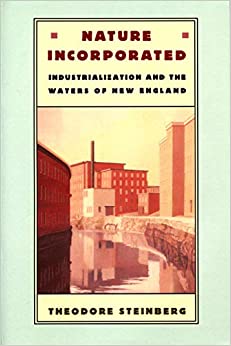
(A great deal of arrogance surrounds this late-twentieth-c...)
A great deal of arrogance surrounds this late-twentieth-century attitude toward the environment, and a great deal of history as well. What started as a research paper at Brandeis University expanded into a book that explores the role of the Industrial Revolution in this aggressive stance toward the natural world. The transformation of nature is at least as old as our presence as a species on this planet. But the advent of the industrial age marked a shift in humankind's relations with the earth. Steinberg concerns himself mainly with describing this shift as it was felt in New England, to journey back to a time when the task of subduing nature was full of hard-fought battles and much less arrogance.
https://www.amazon.com/Nature-Incorporated-Industrialization-Waters-England/dp/0870239430/ref=sr_1_1?dchild=1&keywords=Nature+Incorporated%3A+Industrialization+and+the+Waters+of+New+England%2C&qid=1591342212&s=books&sr=1-1
1991
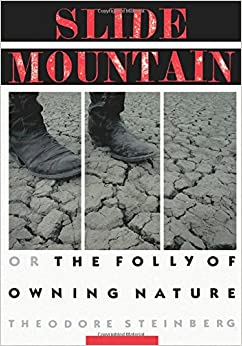
(The drive to own the natural world in twentieth-century A...)
The drive to own the natural world in twentieth-century America seems virtually limitless. Signs of this national penchant for possessing nature are everywhere - from suburban picket fences to elaborate schemes to own underground water, clouds, even the ocean floor. Yet, as Theodore Steinberg demonstrates in this compelling, witty look at Americans' attempts to master the environment, nature continually turns these efforts into folly. In a rich, narrative style recalling the work of John McPhee, Steinberg tours America to explore some of the more unusual dilemmas that have arisen in our struggle to possess nature.
https://www.amazon.com/Slide-Mountain-Theodore-Steinberg/dp/0520207092/ref=sr_1_1?dchild=1&keywords=Slide+Mountain%3A+or%2C+The+Folly+of+Owning+Nature&qid=1591342387&s=books&sr=1-1
1995
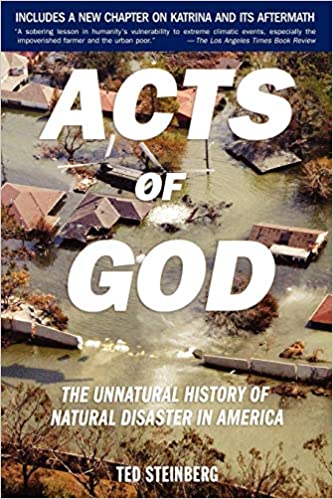
(Steinberg's Acts of God is a provocative history of natur...)
Steinberg's Acts of God is a provocative history of natural disasters in the United States. This revised edition features a new chapter analyzing the failed response to Hurricane Katrina, a disaster Steinberg warned could happen when the book first was published. Focusing on America's worst natural disasters, Steinberg argues that it is wrong to see these tragedies as random outbursts of nature's violence or expressions of divine judgment. He reveals how the decisions of business leaders and government officials have paved the way for the greater losses of life and property, especially among those least able to withstand such blows - America's poor, elderly, and minorities. Seeing nature or God as the primary culprit, Steinberg explains, has helped to hide the fact that some Americans are simply better able to protect themselves from the violence of nature than others.
https://www.amazon.com/Acts-God-Unnatural-History-Disaster/dp/0195309685/ref=sr_1_1?dchild=1&keywords=Acts+of+God%3A+The+Unnatural+History+of+Natural+Disaster+in+America%2C&qid=1591342569&s=books&sr=1-1
2000
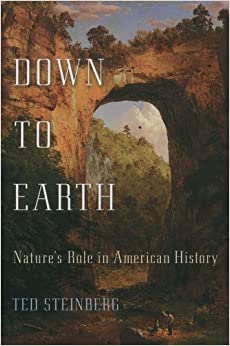
(In this ambitious and provocative text, environmental his...)
In this ambitious and provocative text, environmental historian Ted Steinberg offers a sweeping history of our nation - a history that, for the first time, places the environment at the very center of our story. Written with exceptional clarity, Down to Earth re-envisions the story of America "from the ground up." It reveals how focusing on plants, animals, climate, and other ecological factors can radically change the way that we think about the past. Examining such familiar topics as colonization, the industrial revolution, slavery, the Civil War, and the emergence of modern-day consumer culture, Steinberg recounts how the natural world influenced the course of human history. From the colonists' attempts to impose order on the land to modern efforts to sell the wilderness as a consumer good, the author reminds readers that many critical episodes in our history were, in fact, environmental events. He highlights the ways in which we have attempted to reshape and control nature, from Thomas Jefferson's surveying plan, which divided the national landscape into a grid, to the transformation of animals, crops, and even water into commodities.
https://www.amazon.com/Down-Earth-Natures-American-History-ebook/dp/B00APZQ6KI/ref=sr_1_3?dchild=1&keywords=Down+to+Earth%3A+Nature%27s+Role+in+American+History&qid=1591342980&s=books&sr=1-3
2002
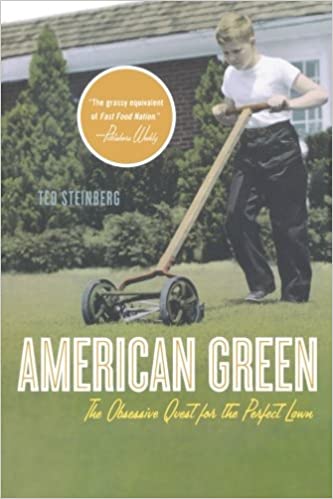
(The rise of the perfect lawn represents one of the most p...)
The rise of the perfect lawn represents one of the most profound transformations in the history of the American landscape. American Green, Ted Steinberg's witty exposé of this bizarre phenomenon, traces the history of the lawn from its explosion in the postwar suburban community of Levittown to the present love affair with turf colorants, leaf blowers, and riding mowers.
https://www.amazon.com/American-Green-Obsessive-Quest-Perfect/dp/0393329305/ref=sr_1_1?dchild=1&keywords=American+Green%3A+The+Obsessive+Quest+for+the+Perfect+Lawn&qid=1591343723&s=books&sr=1-1
2006
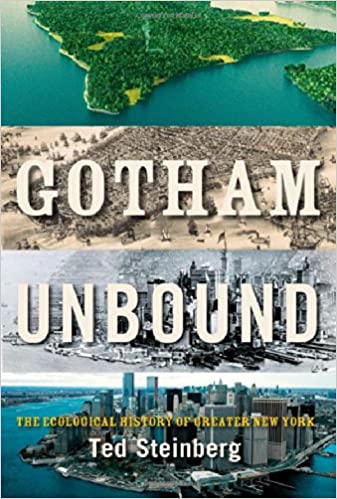
(Gotham Unbound recounts the four-century history of how h...)
Gotham Unbound recounts the four-century history of how hundreds of square miles of open marshlands became home to six percent of the nation’s population. Ted Steinberg brings a vanished New York back to a vivid, rich life. You will see the metropolitan area anew, not just as a dense urban goliath but as an estuary once home to miles of oyster reefs, wolves, whales, and blueberry bogs. That world gave way to an onslaught managed by thousands, from Governor John Montgomerie, who turned water into land, and John Randel, who imposed a grid on Manhattan, to Robert Moses, Charles Urstadt, Donald Trump, and Michael Bloomberg.
https://www.amazon.com/Gotham-Unbound-Ecological-History-Greater/dp/1476741247/ref=sr_1_1?dchild=1&keywords=Gotham+Unbound%3A+The+Ecological+History+of+Greater+New+York&qid=1591346208&s=books&sr=1-1
2014
Ted Steinberg was born on April 25, 1961, in Brooklyn, New York, United States. He is the son of Seymour and Helen Steinberg. He was raised in Merrick, Long Island, New York.
In 1983 Ted Steinberg received a Bachelor of Arts degree from Tufts University. In 1989 he obtained a Doctor of Philosophy from Brandeis University under the supervision of David Hackett Fischer, Donald Worster, and Morton Horwitz.
From 1990 to 1993 Ted Steinberg was a visiting assistant professor at the University of Michigan, and from 1993 to 1996 he was an assistant professor at the New Jersey Institute of Technology. From 1996 to 1999 Steinberg was an associate professor of history and law at Case Western Reserve University and became a professor of history and law in 1999.
He has received fellowships from the American Council of Learned Societies and the National Endowment for the Humanities. In 2006 he was the B. Benjamin Zucker Fellow at Yale University. Steinberg has written for the New York Times, the Los Angeles Times, Natural History, Orion, the Chronicle of Higher Education, and the Guardian and has appeared on numerous radio and television shows including Radio Times With Marty Moss-Coane, The Leonard Lopate Show, The Dennis Prager Show, The Michael Smerconish Show, Marketplace Money, You Bet Your Garden, The Jerry Doyle Show, The Mischke Broadcast, Martha Stewart Living Radio, To the Best of Our Knowledge, Penn and Teller: Bullshit and CBS Sunday Morning. His work has been discussed in print by Malcolm Gladwell, Ellen Goodman, Elizabeth Kolbert, Jeff Sharlet, and Margaret Talbot.
Steinberg’s publications have focused on the intersection of environmental, social, and legal history. His books are American Green: The Obsessive Quest for the Perfect Lawn (2006); Down to Earth: Nature’s Role in American History (2002); Acts of God: The Unnatural History of Natural Disaster in America (2000); Slide Mountain or the Folly of Owning Nature (1995); and Nature Incorporated: Industrialization and the Waters of New England (1991).
(In this ambitious and provocative text, environmental his...)
2002(Gotham Unbound recounts the four-century history of how h...)
2014(A great deal of arrogance surrounds this late-twentieth-c...)
1991(The rise of the perfect lawn represents one of the most p...)
2006(Steinberg's Acts of God is a provocative history of natur...)
2000(The drive to own the natural world in twentieth-century A...)
1995In the interview, Ted Steinberg said about his influences: "My biggest influence would definitely be my high school social studies teacher, Fred Harrison. It was Advanced Placement United States History, and there was a lot we had to do to prepare for the AP exam, memorizing facts and whatnot, but he had different ideas, really radical approaches. He gave us materials focusing on a social history - we read about people that didn’t usually have a voice in history. That’s when I realized - I had a mind, and I could use it! I could engage in ideas, not just facts. History is all about interpreting. Another important influence was my grad school advisor Donald Worster. He was the founding father of environmental history. He’s a dear friend, a 1st class intellectual. He impacted my life in a way that makes me want to impact lives in the same way. If I can change one student’s life the way Fred Harrison and Donald Worster impacted me, I’d consider my career successful."
Steinberg is an advocate for free speech and the rights of the Palestinian people. He was inspired by Noam Chomsky and Edward Said.
In 1988 Ted Steinberg married Maria Del Monaco, an attorney. They have two children: Nathan, Harry.
